What Exactly Is Lemon Cream And How Do You Use It?
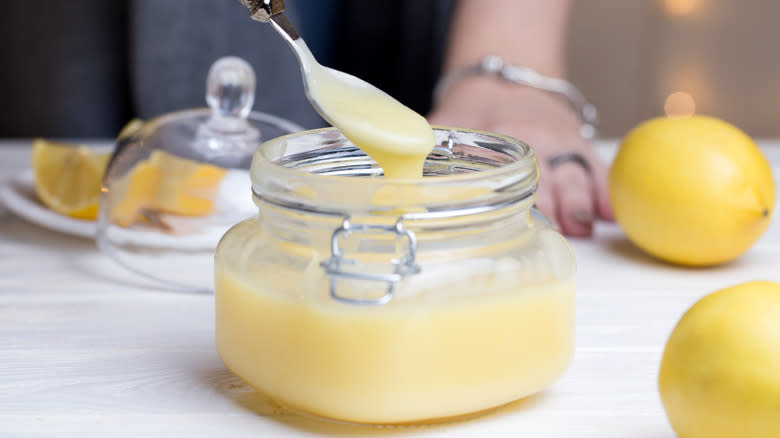
Lemon is an ingredient that tastes great when paired with both sweet and savory foods, but its tart, citrus flavor really shines in desserts, especially as a filling in cakes and pies. While many of these recipes may call for familiar lemon curd, there's another often-used delicious lemon ingredient that you may not know as well and that's lemon cream. If you've stumbled across this ingredient in a recipe and assumed it was just another term for lemon curd, hold that mixer, and don't go a step further.
While lemon cream is easily confused with lemon curd thanks to very similar names and ingredients, the two are arguably more different than they are alike. Understanding what sets lemon cream apart comes down to knowing how it's made, how that impacts its unique flavor and texture, and the many ways it can be used not only in decadent, citrusy desserts but in everyday fare.
Read more: Cake Hacks Every Baker Will Wish They Knew Sooner
What Is Lemon Cream?
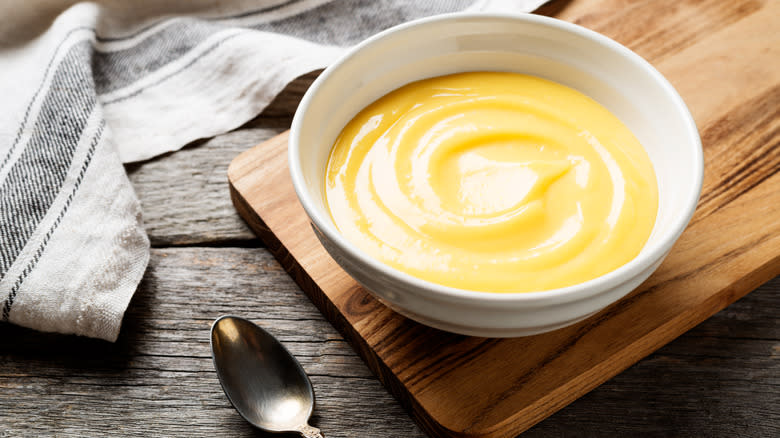
Lemon cream is a light and fluffy, custard-like dessert ingredient that is smoother and much more velvety than classic lemon curd, with a texture more akin to yogurt or soft whipped cream in contrast to lemon curd's thick, gelatinous texture. Though some attribute the invention of lemon cream to French pastry chef Pierre Herme, lemon cream is likely not a modern invention.
Recipes for lemon cream date back centuries with one version of lemon cream in Amelia Simmons' 1796 cookbook "American Cookery" suggesting it's a dessert that came to America with European settlers, who continued making it in the New World. While the closely related lemon curd is a British staple, it wasn't necessarily the Brits who brought over lemon cream. Sicilian lemon cream has long been eaten as both a spread and a pudding while the French lemon cream tart is a beloved favorite.
Regardless of its exact origins, lemon cream is now often enjoyed across multiple cultures. It's also incredibly easy to make and consists of just a few key ingredients, making it pretty fail-safe even for beginner cooks.
The Difference Between Lemon Cream And Lemon Curd Is How It's Made
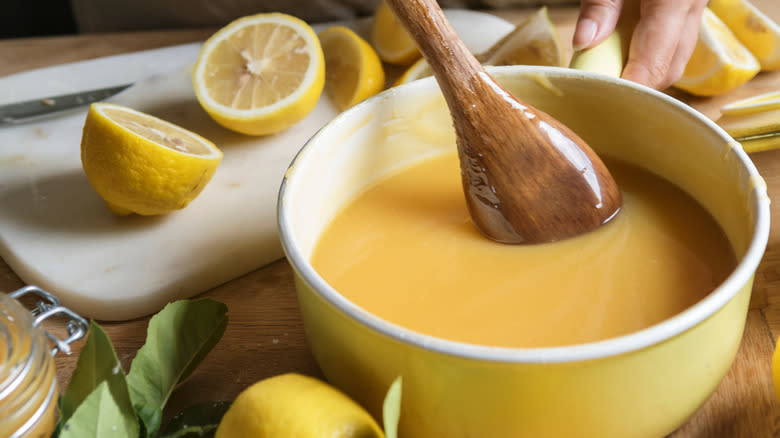
While lemon cream typically contains the same four simple ingredients as lemon curd -- lemons, eggs, sugar, and butter -- it sometimes contains a few other ingredients, too. These can include salt, lemon zest, whipping cream, oil, and gelatin. It's up to you which recipe you want to follow, and each may have slight variations in taste and texture with some favoring more of the tart lemon flavor and others opting for more of the luscious creaminess.
The cooking method is what sets lemon cream apart from the get-go. While lemon curd's ingredients are all cooked together, lemon cream is typically made by first gently cooking the eggs, sugar, and lemon juice over a double boiler. Once it's thickened, it's removed from the heat and, once it's slightly cooled, the butter gets beaten into the mixture. By adding the butter at the end, the lemon cream stays smoother and silkier than lemon curd, as well as lighter in color.
What Does Lemon Cream Taste Like?
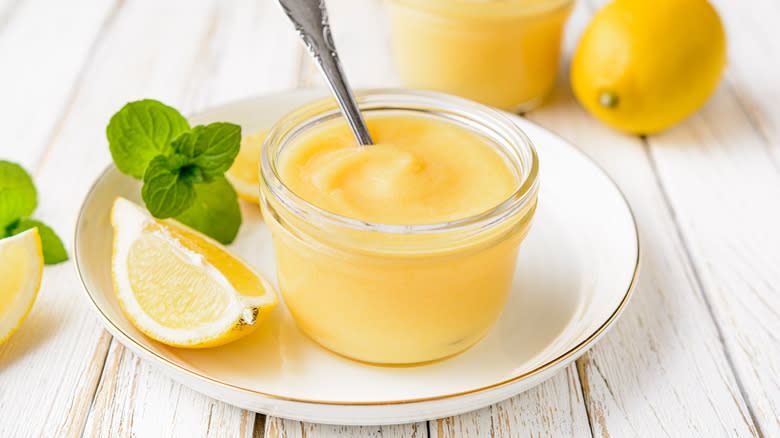
Like lemon curd, lemon cream has a sweet taste with a fragrant, lemon flavor. Because lemon cream incorporates the butter at the end and often has a higher butter content overall than lemon curd, the lemon flavor is a bit lighter than most lemon curd. As such, the dessert typically leans more on the sugary side rather than tart, making it enjoyable for people who aren't into powerful citrus flavors.
One thing to note about lemon cream is that the taste can change depending on how (and in what) it's made. Some cooks report their lemon cream coming out with a metallic flavor. This is usually due to using what's called reactive cookware. Reactive cookware is made from metals that include iron, copper, aluminum, and non-stainless steel. When highly acidic ingredients, like the lemon juice used in lemon cream, are used in cookware made from reactive metals, it can lead to a metallic-tasting final product — yuck! To avoid this, use glass or stainless steel cookware to make your lemon cream.
How To Use Lemon Cream

Since lemon cream is already cooked, it shouldn't be cooked again inside of your desserts. Instead, you'll want to add it to already-baked pastries or cakes. Luckily, there are many ways to use this delicious ingredient and because lemon cream has such a light flavor, it's easy to pair with other foods.
Depending on how you want to use your lemon cream, it may be too thin and creamy to use right away after it's made. If so, chill it slightly in the fridge to allow it to set. While it's an obvious choice for classics like French lemon cream tarts, and as a light, citrusy filling between layers of cake, lemon cream is also great for eating on its own with a sprig of mint or topped with a berry jam. You can also use it to top shortbread and cookies or even enjoy it in place of jelly or jam on your morning toast.
If you've made your lemon cream well ahead of time and stored it in the fridge (where it can last up to five days when tightly sealed), just warm the cream slightly over a double boiler to help soften it back up and enjoy!
Where To Buy Lemon Cream
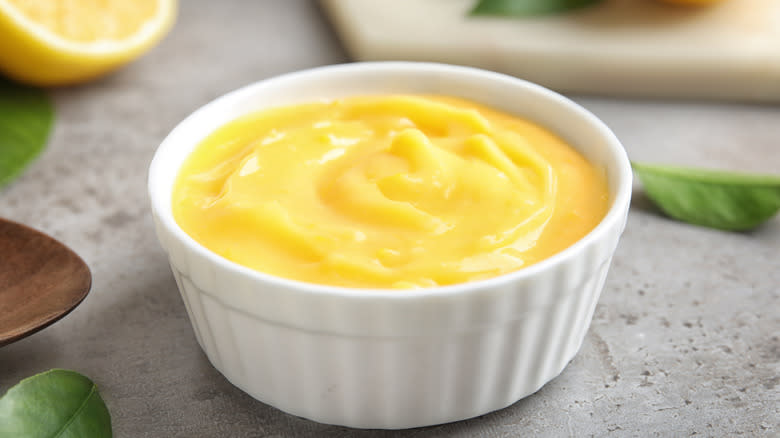
While lemon cream is easy to make at home, you may just not have the ingredients or time to prepare it and chill it before using it in a favorite recipe. Luckily for home bakers who would rather purchase lemon cream, it is available from some supermarkets and specialty shops.
What passes as store-bought lemon cream is often sold in cans and jars in the baking section of major grocery stores, though its ingredients, flavor, and texture may differ from homemade versions in order to make it shelf-stable. While the use of preservatives and the elimination of butter in store-bought versions means the lemon cream will last longer, it does also mean the flavor won't be as fresh or rich as homemade.
If you're after something more closely resembling homemade lemon cream, you may want to look into buying a jar of Sicilian lemon cream. While you'll have to special order it online or find a local specialty shop that imports it, the ingredients are a lot more similar to what you'd get if you cooked lemon cream in your own kitchen. Regardless of how you choose to acquire your lemon cream, it will no doubt become a fast favorite.
Read the original article on Daily Meal.

